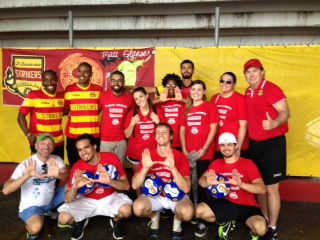Legendary college basketball coach John Woode said, “Sports do not build character. They reveal it.”
A growing body of research shows that participating in sports plays a positive role in youth development, including improved school achievement, higher self-esteem, fewer behavioral problems, and stronger relationships with both peers and family.
These social and developmental aspects are even more important for youth with Autism Spectrum Disorders (ASD), a neurological condition that affects the way the brain develops and processes information.
 Last weekend, UM students participated in a soccer clinic geared toward youth with ASD aged 5-15 and their siblings, organized by the University of Miami-Nova Southeastern University Center for Autism and Related Disabilities (UM-NSU CARD) – a service center for individuals with ASD and their families through the University of Miami College of Arts & Sciences Department of Psychology. The two-hour program gave participants an excellent opportunity to reveal their characters.
Last weekend, UM students participated in a soccer clinic geared toward youth with ASD aged 5-15 and their siblings, organized by the University of Miami-Nova Southeastern University Center for Autism and Related Disabilities (UM-NSU CARD) – a service center for individuals with ASD and their families through the University of Miami College of Arts & Sciences Department of Psychology. The two-hour program gave participants an excellent opportunity to reveal their characters.
CARD Executive Director and Clinical Professor of Psychology and Pediatrics Michael Alessandri requires all students in his upper-level Genetic and Developmental Disorders course to complete one or more fieldwork assignments where they have direct contact with individuals with ASD and “give back” in the form of community engagement and service.
He said, “The most critical aspect of learning in a course on developmental disorders is to make a personal connection with those who are affected by these conditions through community engagement activities such as CARD’s soccer clinics.”
Several of his students participated in the soccer clinic on Saturday.
Senior Psychology major Charlotte Hickok said, “The event helped me get a better understanding of autism in the sense that I was able to interact with kids with a huge range of functionality. Some of the children were highly functional, while others really struggled with the soccer exercises.” She added that some participants found it difficult to focus on the activity or to demonstrate the patience to learn the required skills.
Senior Paul Rabindra Singh, who is majoring in Psychology and Philosophy, said that the class material prepared him for what to expect at the clinic and allowed him to enjoy the experience of working with the youth.
“The combination of the class material and the field experience allow for a richer and more beneficial learning experience,” he said, adding that the clinic “allowed me to view and attribute ASD in a whole different light.”
Singh said he is looking forward to volunteering more with individuals with intellectual and developmental disorders.
The clinic was an initiative of CARD’s Project CHOICE: Creating Healthy Opportunities for Interaction, Communication & Enjoyment. More than 7,000 families access services through CARD each year. These include programs aimed toward adults and children with ASD, their caregivers, and siblings. CARD also provides outreach activities to teachers and educational institutions, and the community at large.
Alessandri added, “My students consistently tell me that the required community engagement activities transform them and their own vision for their futures in a way that they had never anticipated.”
The soccer clinic was sponsored by Tire Choice & Total Car Care, and the Ft. Lauderdale Strikers Football Club.

